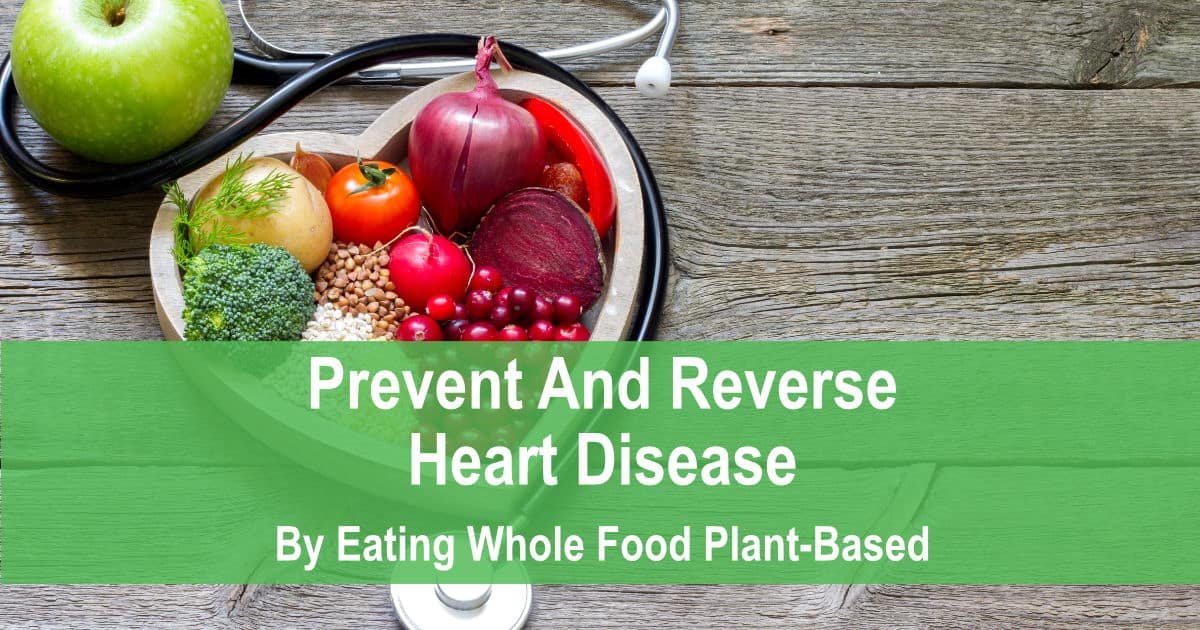Prevent and Reverse Heart Disease by Eating Whole Food Plant Based

Is it even possible to reverse heart disease? Some studies have shown that there is a connection between food and heart disease prevention and reversal. Most notably is Dr Esselstyn’s heart disease study, as documented in his book Prevent and Reverse Heart Disease.
Foundations of the Study
Population studies show that heart disease is rare in parts of the world where cholesterol levels are generally lower than 150 mg/dL. Heart disease is more common in places where the cholesterol levels are generally above that mark.
My goal: to use plant-based nutrition to reduce the patients’ cholesterol levels to below 150 mg/dL–the level seen in cultures where the disease is virtually non-existent–and to see what effect it has on their health.
— Dr Esselstyn (Prevent and Reverse Heart Disease, page 19)
Note: Cholesterol is found only in animals, not in plants.
Twenty-four patients with severe heart disease entered the program in the 1980s. Their cardiologist told most patients there was nothing more they could do for them. These patients were basically sent home to prepare for death.
Six patients left the program because it was apparent from the beginning that they would not comply with the dietary guidelines. Thus, a total of eighteen participants (seventeen men and one woman) took part in the study.
In the eight years before the study started, all eighteen participants together experienced 49 cardiovascular events:
- 4 heart attacks
- 3 strokes
- 7 bypass surgeries
- 15 cases of increased chest pain (angina)
- 13 cases of disease progression
- 2 angioplasty procedures
- 2 worsening stress tests
The average cholesterol level of the eighteen participants at the start of the study was 246 mg/dL.
Did the Patients Reverse Heart Disease?
The eighteen patients were put on a whole food plant-based diet with cholesterol-lowering medication.
Five years into the study, the average cholesterol levels dropped from 246 mg/dL to 137 mg/dL. Eleven patients were able to do a follow-up angiogram at the five-year mark to check their arteries. All eleven had no progression of their heart disease. Eight of them were reversing heart disease! The percentage of reversed heart disease ranged from 10%, 20%, 30% up to one case of a full reversal of heart disease.
We now had irrefutable scientific evidence that heart disease could be arrested and reversed. And if it can be reversed, it can also be prevented.
— Dr Esselstyn (Prevent and Reverse Heart Disease, page 50)
One death occurred at the six-year mark. It was a man in his sixties who had joined the study two weeks after having suffered a massive heart attack. At the five-year mark, two areas where his arteries had narrowed showed an improvement, while two other arteries were unchanged. Despite this mild heart disease reversal, his heart was so scarred, and eventually he died of cardiac arrhythmia.
At the twelve-year mark, all seventeen remaining patients had total cholesterol below 150 mg/dL. Their angina reduced or receded completely, their sexual activity was enhanced, one person was cured of impotence, and most were fit and active.
One person suffered a cardiac event during the studies. Six years into the study, one man went off the dietary program for eighteen months. His angina returned (after it had disappeared), and he required bypass surgery.
Among the fully compliant patients, during the twelve-year study, there was not one further clinical episode of worsening coronary artery disease after they committed themselves to keeping cholesterol within the safe range.
— Dr Esselstyn (Prevent and Reverse Heart Disease, page 55)
These patients are now heart-attack proof.
— Dr Esselstyn (Prevent and Reverse Heart Disease, page 54)
The Six Patients Who Left the Study
What happened to the six patients who initially joined but then quickly aborted the study? Since then, together they have suffered:
-
1 case of congestive heart failure
-
4 bypass operations
-
4 cases of increased angina
-
1 angioplasty
-
1 death from arrhythmia complications
-
2 episodes of ventricular tachycardia
So, the study concluded that the key to preventing and reversing heart disease is to lower cholesterol intake by consuming a plant-based diet without added oils. Find out about the specific dietary recommendations for heart health.
As an Amazon Associate I earn from qualifying purchases.

